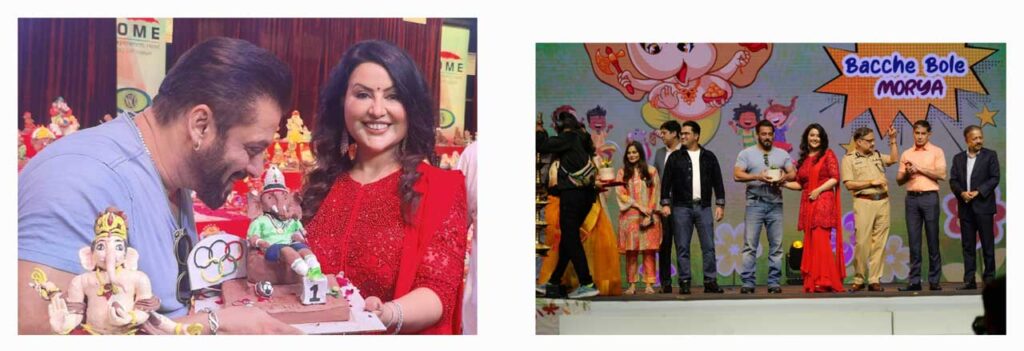Amruta Fadnavis’ ‘Eco Friendly Ganesha Movement’ Gets Support From Salman Khan!
Salman Khan, addressing a captivated audience at #AmrutaFadnavis’ #DivyajFoundation event at the Dome SVP Stadium in Worli on August 28, passionately advocated for the use of eco-friendly materials in crafting Ganesh idols. “It is time we teach adults lessons in being earth-friendly. Let us use terracotta or other eco-friendly materials to create our Ganesha idol this year,” he stated to thunderous applause.
The “Bacche Bole Morya” event, organized by the Divyaj Foundation in collaboration with Chhatra Sansad India and supported by the BMC and Mumbai Police, was not just a celebration of Lord Ganesha; it was a movement toward a sustainable future. The initiative signified a major shift in how Mumbai’s beloved Ganesh Chaturthi was celebrated—focusing on environmental conservation and community involvement.
Amruta Fadnavis, the brain behind Divyaj Foundation and the Bacche Bole Morya event, was elated as the children took yet another earth-friendly advice from Salman Khan. Her enthusiasm reflected the success of the initiative in inspiring the younger generation to adopt sustainable practices.
Ganesh Chaturthi, deeply rooted in tradition, often posed environmental challenges due to the immersion of non-biodegradable idols. Recognizing this issue, the Divyaj Foundation’s “Bacche Bole Morya” initiative aimed to educate the younger generation about the importance of eco-friendly practices, beginning with the creation of sustainable Ganesh idols. This initiative demonstrated that meaningful change begins with children, who are the torchbearers of a better tomorrow.
During the event, students from BMC schools across Mumbai showcased eco-friendly idols they had crafted from natural, biodegradable materials. These creations symbolized the children’s role in environmental protection and emphasized the importance of fostering creativity, cultural pride, and environmental responsibility among the youth.
The event was a vibrant celebration that included cultural performances by the young participants. The evening’s highlight was the performances by renowned singers Sonu Nigam and Kailash Kher, who lent their voices to celebrate and encourage the children’s efforts in contributing to a greener planet.
Amruta Fadnavis, a banker, singer, and social activist, underscored the importance of such initiatives in shaping a sustainable future. She stated, “By starting with our children, we have planted the seeds of awareness and responsibility that will grow into a deep-rooted respect for Mother Earth. It’s about teaching them that every small action counts, and that through mindful choices, we can protect our planet.”
The “Bacche Bole Morya” initiative was not just about crafting eco-friendly idols; it redefined the celebration of Ganesh Chaturthi to ensure that traditions did not come at the expense of the environment. Through strategic partnerships, comprehensive campaigns, and robust community involvement, the initiative aimed to set a new standard for eco-friendly celebrations in Mumbai and beyond.
Supported by the BMC, Mumbai Police, and active participation from various community segments—including schools, government bodies, and celebrities—the initiative highlighted the importance of inclusive leadership in driving collective change. The goal was clear: to promote sustainability, foster community engagement, and create a world sustainable for future generations.
As Mumbai’s children led the way in this eco-friendly celebration, “Bacche Bole Morya” stood as a powerful example of how traditions could evolve to meet the needs of the time, ensuring the preservation of cultural heritage while safeguarding the planet for the future.
In continuation to Bacche Bole Morya and #MiKachraKarnarNahi campaign launch, Amruta Fadnavis and Divyaj Foundation has also called upon people for a beach clean-up initiative at Versova Beach post Ganpati Visarjan that is on coming Wednesday, 18th September, 2024. Looks like this Ganesh Chaturthi is Ecofriendly in more ways than one, thanks to philanthropist Amruta Fadnavis.
By Keerti Kadam



